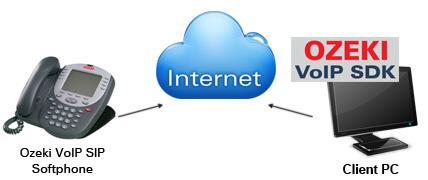Define VoIP
Since VoIP technology has been developed for the transmission of digitized data packets over the Internet (instead of traditional phone lines), VoIP transmission has become increasingly popular. Emerging of VoIP technology derives from the very first demands for a lower-cost telecommunication services and broadband connectivity.

How VoIP Works
VoIP technology allows to convert analog voice signal into digital data and transmits it over the Internet (VoIP = Voice over Internet Protocol). In other words, voice signals are broken down into data packets that can be compressed, converted and transmitted over the Internet to the destination.
On the other end, packets are reassembled, decompressed, and converted back into a voice stream. In this way, the recipient can easily receive the call. VoIP calls can be made from a computer, a special VoIP phone, or a traditional phone with or without an adapter. To be able to receive calls from regular telephones, you need to have a regular telephone number but anyway you can easily make phone calls even in this way, as well.
As it was mentioned, VoIP converts data into digital signal. The advantages of this feature: digital format can be better controlled since it can be compressed, routed, converted, etc. Digital signals are also more noise tolerant than analog signals though environment can more affect digital signals. Real-time errorless data streaming is ensured by using Quality of Service (QoS), therefore the support of interactive data voice exchange can be obtained.
What kind of equipment is needed?
VoIP technology requires broadband Internet connection. Further requirements depend on the VoIP service you wish to use. In this way you may need a computer, a special VoIP telephone, or a regular telephone with an adapter. If you are calling a regular telephone number, the person you are calling does not need any special equipment, just a telephone. However, if the other person also uses VoIP services, calls and services can be totally free.
What are the advantages of VoIP?
VoIP may offer advantages, features and services that are not available if you use traditional telephone services. VoIP also ensures great numbers of interesting, useful and enhanced features, and many of them are free or cheaper than in case of traditional phones. With VoIP, you can also decide whether to keep your regular telephone service.
Reduce operational costs
VoIP technology helps reduce communication and infrastructure costs while several services are also available like conference calling, IVR, call forwarding, automatic redial without extra fees. Lower costs are due to the fact that Internet costs are lower than regular telephone calls (VoIP calls are billed per megabyte).
Offers flexibility
VoIP technology allows tasks and services that cannot be implemented with PSTN. In this way it is possible to transmit more than one telephone calls over a single broadband connection without the need of extra lines.
Secure calls are also available easily by encrypting and authenticating the existing data stream while it is quite difficult to achieve with regular telephone calls. Furthermore, you only need the proper (fast and stable) Internet connection to be able to connect to a VoIP provider from anywhere.
With VoIP technology other services can be integrated like video conversation, data exchange during the conversation, managing addressbooks, etc.
- VoIP technology provides better bandwidth efficiency
- Lower transfer costs (billed per amount of information (data) sent over the Internet)
- Reduces network costs
- New features increases productivity
- It is possible to connect with other tools
Corporate use
Since VoIP technology offers high bandwidth and low costs for callings, it is gradually recognized by businesses and used for reducing phone costs. In businesses, VoIP technology allows services that handle all communications (e.g. calls, faxes, voice mails, etc) as discrete units that can be delivered via any means and to any handset.
VoIP technology can be easily implemented for small-to-medium business and medium to large enterprises too. Due to the fact that VoIP technology allows to run voice and data communication over a single network, infrastructure costs can be reduced to a great extent.
Beside its cost-efficiency, these systems are easy to use thanks to the simple interface.
Related Pages
More information























